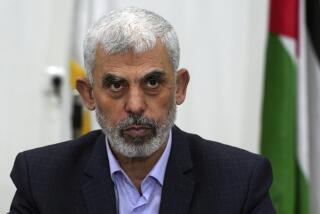Israel Captures Most-Wanted PLO Guerrilla Commander
JERUSALEM — The Israeli army said Wednesday that it has captured its most-wanted PLO guerrilla, the commander of the Black Panthers group that was behind scores of killings in the Israeli-occupied territories.
The arrest of Ahmed Awad Ikmail and five of his men, at a hide-out near his hometown of Kabatiya in the occupied West Bank, brought immediate complaints from Palestine Liberation Organization leaders that Israel was violating the spirit of the peace agreement signed Sept. 13.
Ziad abu Zayyad, a leader of the PLO’s mainstream movement Fatah, told a news conference, “The operation carried out last night . . . is a provocation and an attempt to create a tense atmosphere on the eve of the agreement’s entry into effect.”
In fact, the arrests did not appear likely to create any major disruption as PLO leaders prepare for the first stage of Palestinian self-rule in Gaza and the West Bank town of Jericho, to take effect in mid-October.
But they did point up the many possible pitfalls of the PLO-Israeli agreement, which was concluded in some haste and left a great many unanswered questions about how the occupied territories will be run.
PLO leader Yasser Arafat has issued orders for all Fatah terrorist actions against Israelis to cease, and the Black Panthers, along with other PLO military cells, had reportedly agreed. But Israel, which had been hunting Ikmail for years, nonetheless maintained that it has the right to pursue and capture PLO fugitives accused of killings.
“Fatah has now decided to stop using its arms against Israel; Israel must likewise stop using its arms for pursuing these soldiers,” said Sari Nusseibeh, a PLO leader in the territories. “Those people who were arrested must be treated as prisoners of war.”
The Black Panthers are considered among the most violent of the PLO subgroups. They originated in the West Bank town of Nablus, young men intent on using more powerful weapons than the stones and Molotov cocktails typically used in the intifada, the Arab uprising against Israeli occupation.
For the last three years, they have dominated the hills around the town of Janin, controlling some areas and meting out their own form of justice--interrogation, torture and death--to Palestinians they suspected of collaborating with Israeli authorities.
Although they concentrated on collaborators, the Black Panthers also were believed to have killed several Israelis and to have waged attacks on Israeli army bases.
The army accuses Ikmail, in his 30s, of being behind the slayings of an Israeli soldier and at least three civilians and of personally killing about 20 collaborators.
More to Read
Sign up for Essential California
The most important California stories and recommendations in your inbox every morning.
You may occasionally receive promotional content from the Los Angeles Times.










